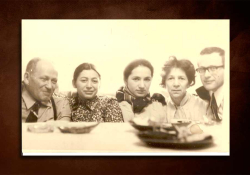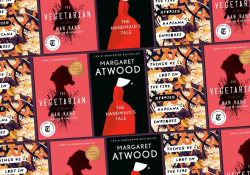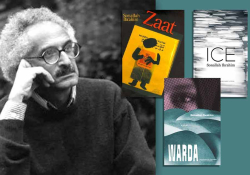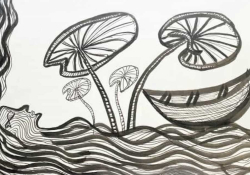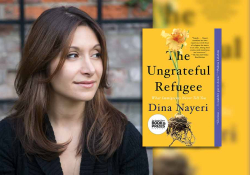A Fistful of Dollars

Translator’s note: On July 16, 2020, the Cuban government announced a set of economic reforms that includes the immediate rescission of the 10 percent surcharge on the US dollar. This move coincides with the decision to open stores, designated tiendas de MLC (stores in freely convertible currency), in which Cubans may purchase—in dollars, using a variety of magnetic stripe cards—food, toiletries, and other goods that are in short supply in stores that trade in either of the country’s two currencies, the Cuban peso and the convertible peso. The immediate impact is twofold: it provides the bankrupt nation with much-needed hard currency, which Cubans receive through remittances, while at the same time disadvantaging ordinary Cubans who have no access to dollars. – George Henson
July 16, 6:30pm. My mother, with seventy years in tow, sits on the edge of her bed, her gaze fixed on the television. A group of government officials is trying to convince the population of something. Something to do with foreign currency. I hear the phrases: freely convertible currency, the enemy, social media, ounces of beans, etc.
I don’t pay attention to what they’re saying. Naturally, I’m suspicious. I don’t believe them.
I invest my time in looking at the old woman’s face. She nods. This is different, she tells me. This time they’re really doing things to help.
I can’t hold back, and I laugh. Mom ignores me and continues to watch the Mesa Redonda like a small child.[i]
She seems to believe them.
I put down the phone and begin to take note of my mother’s body. Her adipose legs covered in veins. Her knees that cause her so many problems. Her worn nightgown.
(My mother, with the punctuality of a Japanese train, goes to bed every day at eight.)
I see her arms. The wrinkles on her neck. Her hopeful eyes. Hopeful once again.
The news of the day is that the dollar is going to trade equal to the Cuban convertible peso, and that they’re going to open a slew of new stores, but only for those who have dollars.[ii]
I look at my mother’s hands. She has a habit of playing with her nails. I remember how years ago, many years ago, she abandoned her studies to go cut sugarcane for the revolution. Also for the revolution, she left one of her boyfriends to go plant coffee.
(My mom hasn’t been lucky in love.)
I look at her chin. It has a drop of the café con leche we had for dinner.
She gave all her youth—beauty, intelligence, ability—to the great dream. To the magnificent project that was supposed to lift us all out of poverty.
Somewhere around here there’s a recording of Fidel talking about beef, chicken, milk, and eggs, which looks like a scene taken from a bad science-fiction movie. Mexican science fiction. Saints against National Production you could call it.
Just yesterday she was telling one of her friends a story about “Operation Cobblestone” (the old woman made handicrafts, sold fried stuffed potatoes, rented rooms, edited and designed books). According to her, one of her friends was arrested in the operation, an excellent craftsman, supposedly for possessing illegally obtained leather. For those who don’t know, “Operation Cobblestone” was a police operation carried out against craftspeople. It happened many years ago.[iii]
Well, the point is that her friend, whom the police look for at his house, had a hundred-dollar bill hidden in the pages of an old book by José Martí. A policeman searches the bookcase. He grabs the aforementioned book, opens it, turns it upside down, shakes it, and, by some miracle, the bill doesn’t fall out.
At the time the dollar was banned. The friend was off a few days. His friends mobilized, and through some contacts in high places they attempted to save their friend, but their happiness was short-lived. It turned out to be a trick. Although they said they were taking him to a meeting, the truth is they were taking him to jail. He was in prison for a year out of sheer pleasure.
After that, the old woman said, the mulatto wasn’t good for anything anymore. They’d damaged him.
One of my aunts had to swallow a fifty-dollar bill to avoid going to jail.
One of my aunts had to swallow a fifty-dollar bill to avoid going to jail.
I’m not good at anecdotes, but on countless occasions I’ve listened to Mom tell them.
Still, today the old woman was like a little sheep, innocent, believing what they were saying on TV: everything was for the good of the people.
Mom had to raise me almost alone, with the help of my grandmother, and she worked like a wild woman to give us a home. In the middle of the Special Period,[iv] she had to put aside her health problems to get on a bicycle and travel miles in search of shark meat or used cooking oil.
The oil was black; imagine what that did to the arteries. But it doesn’t matter. We were lucky. There were people worse off.
The old woman survived the seventies, the eighties, the nineties, the aughts, and now, in the middle of a pandemic, this strange thing was happening too.
My mother, before 2006, couldn’t enter hotels like the rest of Cubans.
She couldn’t have a cell phone. She couldn’t travel. She couldn’t and can’t buy a car.
My mother earned about twenty dollars a month.
She was fortunate that her father was an ambassador and, at one time, once a year, she was able to go to a store at 3rd and 70th to buy food you couldn’t find anywhere else on the island.
The old woman, at one time, had to put me to sleep with her on a bed in the living room of the house so she could rent the back room. At the time, a neighbor turned her in for not having a rental permit, and she was fined four hundred dollars.
Nowadays, my mother has a hard time understanding and doing the math with the three currencies in use throughout the country: the dollar, the Cuban peso, the Cuban convertible peso.
I look at her eyes. How many more Mesas Redondas is she going to believe?
How long are average Cubans going to have to continue enduring this situation?
My mom doesn’t remember what cow’s milk tastes like.
The officials who appear on the screen today aren’t the same as a few years ago. Some things have changed, but, in general, everything continues to be the same.
The city is crumbling, and hotels continue to be built. At the entrance to Varadero, there used to be a big sign that read: “All the money collected here is for the people.”[v]
How must those who went to prison for owning dollars feel?
Cuba is like a great game. They congratulate you today for the very thing they punished you for yesterday.
Cuba is like a great game. They congratulate you today for the very thing they punished you for yesterday.
If yesterday they told you to “jump,” today they say “duck.” And people, without thinking twice, obey.
Right now I have only one task, to try to keep the old woman happy and find some protein for her to eat, some salad, or vegetables. I have some dollars, a few pesos, and a little bit in convertible currency, and I don’t have the slightest idea what I should do.
I don’t have a guide. I know, no matter what I do, that I’m going to lose.
But that’s my problem.
I get up off the floor and leave the room.
Already on social media, the memes and jokes about the new measures are starting.
“Humor” is what saves Cubans, people say.
The “new normal” doesn’t seem to be bringing anything good. That was predictable. A country that was already in crisis before has to be worse off now.
The “new normal” doesn’t seem to be bringing anything good.
It looks like the show is over. The old woman drags her flipflops and walks to the refrigerator. She opens the door, leans on it, looks inside. Time stops. The cold air hits her in the face.
Cold Air, For Better or for Worse.[vi] And probably for the next year, Nitza Villapol, pizza with cheese preservative, Russian canned meat, chicken instead of fish. All of this comes to mind as I look at Mom.[vii]
I’m almost forty years old now, and I need to clear my head. I have to defragment my hard drive. Dear God, look at all this shit they’ve dumped on us!
The old woman grabs a piece of bread and puts it on to toast. I can’t leave her alone. I imagine her, alone, in her seventies, in a long queue trying to buy something in X currency.
What will become of the old people who are alone, if the stores in Cuban pesos, the bodegas with the ration card,[viii] and the stores in convertible pesos are enduring, have endured, and will continue to endure raging scarcity?
If all the authorities say is “foreign exchange collection, foreign exchange collection,” without thinking about the human cost.
If we Cubans receive a salary in Cuban pesos and are forced to buy food in another currency, plus a huge tax.
If the prices are outrageous.
If the guards who protect the government’s currencies stand on the sidewalks, brandishing weapons . . .
How could I leave my mother, innocent, old, alone? In the middle of the Wild West?
Many images come to mind. Dust. Bullets. Old horses. Six-shooters.
A western by . . . Clint Eastwood. Sergio Leone. John Ford.
Survival of the fittest. Every man for himself.
I don’t understand this experiment. I don’t believe anything that appears on TV. But maybe like Good Bye, Lenin!, my mission is to keep the old woman happy, away from any concern.
I don’t have the slightest idea how this movie is going to end.
I don’t have the slightest idea how this movie is going to end. This movie from the archives that’s already lasted too long. I just hope it ends soon and that it ends without blood.
But it is hard to know. In any case, in every good western there is always a duel at the end.
Translation from the Spanish
Editorial note: This text originally appeared in the independent magazine El Estornudo.
[i] Mesa Redonda (Round Table) is a weekly news analysis program broadcast on Cuban state-run television in which guests, usually government officials, discuss policy issues.
[ii] Cuba has two currencies, the national peso (CUP), which is equivalent to US $.04, and the convertible peso (CUC), which trades one-to-one with the dollar. Until recently, however, a 10 percent surcharge was applied at the time of exchange.
[iii] This police action, which dates back to the 1980s, targeted artisans who sold their handicrafts in a fair that took place every Saturday in Havana’s Cathedral Square. The stated aim of the operation was to crack down on illicit goods, but many saw it as an effort to quash entrepreneurialism and an incipient informal economy.
[iv] The Special Period is a euphemistic term coined by Fidel Castro to refer to a period of extreme hardship in Cuba, following the collapse of the Soviet Union, on which Cuba had relied for billions of dollars of financial assistance.
[v] Varadero is a resort area located on a long peninsula in Matanzas Province that is home to several hotels that cater primarily to foreign tourists.
[vi] The author is referring here to two plays: Cold Air (Aire frío), by Cuban playwright Virgilio Piñera, and Contigo pan y cebolla (literally, “With you bread and onion”), by Spanish playwright Manuel Eduardo de Gorostiza.
[vii] Nitza Villapol is a cookbook author and cooking-show host, considered Cuba’s Julia Child. She is best known for fundamentally changing Cuban cooking to conform to the vast shortages that Cubans began to face following the Cuban Revolution in general and, in particular, following the Special Period.
[viii] Cubans are provided with a ration card that allows them to buy foodstuffs (rice, beans, cooking oil, chicken, salt, etc.) at highly subsidized prices at small stores in their neighborhoods called bodegas. Although the ration book allows Cubans to shop only once a month, the allotted food usually lasts two to three weeks. To subsidize these rations, Cubans must wait in long lines at state-run stores, known for shortages and limited offerings.





